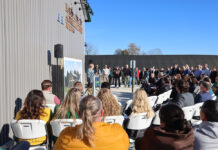
Editor’s Note: On what would have been his 100th birthday, we take a look back on the remarkable life and legacy of Col. Carl Franklin Baswell, one of the most generous benefactors in Arkansas Tech University history.
Col. Carl Franklin Baswell’s story began on May 18, 1922, in Heber Springs, where he was born to Ross and Ruby Baswell.
He graduated from Heber Springs High School in 1940, and it was a fellow Heber Springs graduate who persuaded Baswell to attend Arkansas Tech.
“There was a young man from Heber Springs by the name of Charles Ward, and he was the editor of the Arka Tech (newspaper),” said Baswell in a 2005 interview at his home. “He had encouraged me to come over to Tech, and I received a scholarship because I graduated third in my class. I went over in 1940, and to sustain myself I worked in NYA (National Youth Administration) at Arkansas Tech. I remember we were permitted to earn up to 15 cents per hour, and we could earn up to $17.50 per month. Fifteen of that went toward our subsistence, and we got to put the other $2.50 in our pocket.”
Baswell studied engineering and served as scorekeeper for Wonder Boys’ basketball games during his two years of study on the Russellville campus. He graduated from Tech a few short months after the event that helped determine the course of his life and the lives of many young men from that era.
“I was at Tech when Pearl Harbor happened,” said Baswell. “I can remember coming out of the Rialto Theater in downtown Russellville on Dec. 7, 1941, and someone told me that Pearl Harbor had been bombed. I didn’t even know where that was. I had only left Arkansas once before I joined the Army, but once I got in I was able to travel and see things I’d never seen before. I liked that travel, and I decided right there and then that I was going to make the Army a career. Once I advanced up to the ranks of lieutenant and captain, my goal became to stay in the Army to make full Colonel. And I did it.”
Baswell was wounded during the largest land battle that the United States participated in during World War II, the Battle of the Bulge. He was evacuated to England until near the end of the war in 1945, and he was sitting at a German train station when he received word that World War II was over and his side had prevailed.
Seventy years later, as he sat in the Arkansas State Capitol Rotunda during an event commemorating the anniversary of the war’s end, he summed up how he felt on Aug. 14, 1945, with one word.
“Relief,” said Baswell. “In the yard there was a tanker of French red wine, and we all got loaded.”
The years after WWII brought a wide variety of experiences to Baswell’s life. He helped oversee the reconstruction of numerous destroyed bridges on the German Autobahn and served in the Korean War.
Baswell worked with the U.S. Army Corps of Engineers in the Little Rock district office, where he helped with the construction of the Greers Ferry Dam near his hometown of Heber Springs, the same project that had inspired him to become an engineer as a young boy.
After more than a quarter-century of service, Baswell achieved his career goal when he was promoted to Colonel in 1969.
Baswell entered the private sector after his retirement from the U.S. Armed Services. He was director of international operations for KLEE KG, a German international construction and service firm, from 1974-92. He remained an active engineering and business consultant for many years beyond his retirement.
On May 16, 2009, Baswell became the 100th individual inducted into the Arkansas Tech Hall of Distinction under the Distinguished Alumnus category. Baswell died on Nov. 20, 2016. He was 94.
Baswell’s name lives on at Arkansas Tech.
His generous financial support of Arkansas Tech has included funds for scholarships and a gift during the Return to Glory campaign.
Baswell Residence Hall was dedicated in his honor in 2007 and Baswell Techionery was dedicated in his honor in 2011. Following his passing, the home of Wonder Boys baseball was dedicated in his memory as Carl Baswell Field on March 2, 2019.





